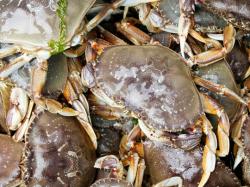Putting The Pinch On Illegal Crabbers In Puget Sound
August 24, 2011 | 1 min to read

Officer Chris Moszeter squatted on the deck of his 28-foot patrol boat and measured the shells of a bucketful of crab.
The fishermen idling alongside his Boston whaler watched uneasily as the state wildlife cop pushed aside several shellfish — ones so small the crabbers should have known they couldn't keep them.
"This one's not even close," Moszeter said, holding up a flailing Dungeness an inch shorter than legal size.
As more people have taken up crabbing in Puget Sound, those paid to police the harvest are noting an uptick in illegal activity.
From recreational fishermen who don't get licenses or ignore quotas and size limits to large-scale poaching by commercial or tribal fishermen, there is no shortage of crustacean scofflaws.
To read the rest of the story, please go to: Seattle Times
